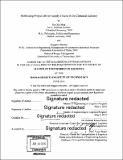Mobilizing project-driven supply chains in the chemical industry
Author(s)
Mok, Sze Xin; Moretto, Ruggero
DownloadFull printable version (5.309Mb)
Other Contributors
Massachusetts Institute of Technology. Engineering Systems Division.
Advisor
Roberto Perez-Franco.
Terms of use
Metadata
Show full item recordAbstract
The company sponsoring our project is a leading chemical manufacturer, supplying a wide range of products on a global scale. One of the most interesting lines of business the company operates is to supply specialty chemicals in faraway places on few weeks' notice. The nature of these supply chains is project- driven, or, in other words, unique, non-repeatable and established for the sole purpose of fulfilling a single project. The company faces the challenge of operationalizing the set-up of such supply chains in order to reduce the amount of time and effort devoted to each supply and maximize learning from each project. This thesis seeks to address the conundrum of setting up project-driven supply chains in a more efficient, effective and easily repeatable way. Through interviews with company personnel, we identify eleven challenges and subdivide them into three categories: Business-Specific, Cross-Border, and Last-Leg. Next, through literature review and interviews with experts, we identify seventeen possible solutions to the above issues, which have the potential to improve planning and execution of project-driven supply chains in the chemical industry. Recognizing that cross-learnings from supply chains in humanitarian and military supply chains are valuable, our interviews include military and humanitarian practitioners, with the aim of increasing the variety of solutions. Using the research data as a basis, we formulate a project-driven supply chain mobilization template aimed at including most critical areas required in setting up project-driven supply chains. This template could be used as both a guideline for planning the mobilization of a supply contract, and as a validation tool to confirm the mobilization process has been thoroughly completed. The adoption of the mobilization template and process via integration with managerial and approval processes is expected to drive a more efficient and effective mobilization of project-driven supply chains for companies within the chemical industry and beyond.
Description
Thesis: M. Eng. in Logistics, Massachusetts Institute of Technology, Supply Chain Management Program, 2016. "June 2016." Cataloged from PDF version of thesis. Includes bibliographical references (pages 83-85).
Date issued
2016Department
Massachusetts Institute of Technology. Supply Chain Management ProgramPublisher
Massachusetts Institute of Technology
Keywords
Supply Chain Management Program., Engineering Systems Division.